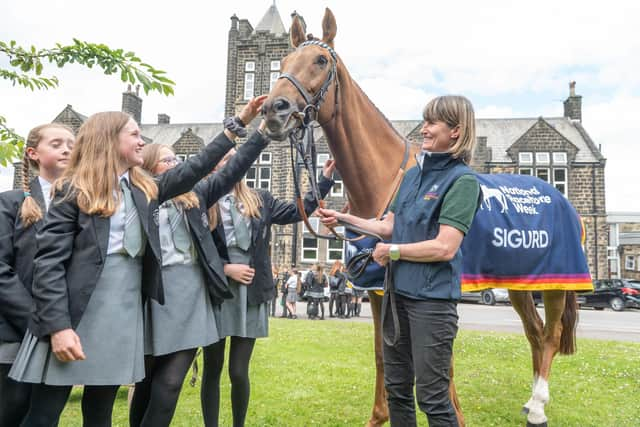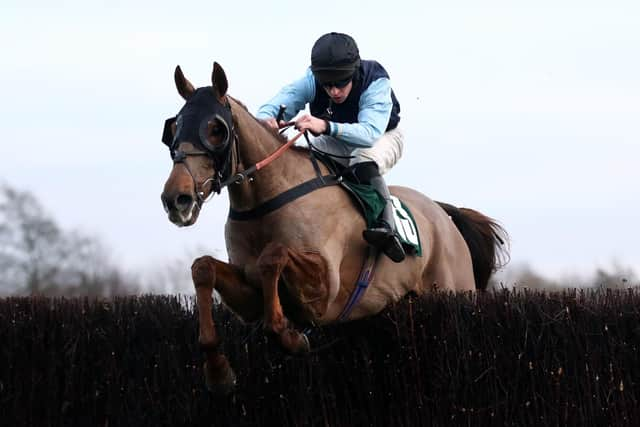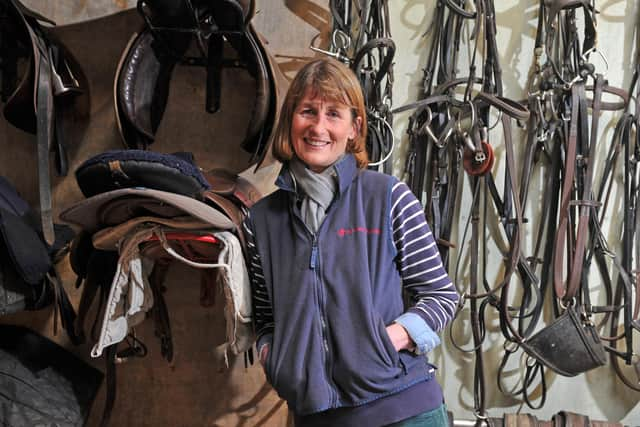How a racehorse and a pony could help to bridge the gap between country and city life in Yorkshire
Jo Foster, is a farmer, race-horse trainer and herself a former jockey and is based in Ilkley where she has a farm and stables as well as writing each week for The Country Post section.
In addition to training winners and running the stables, she takes a racehorse, Sigurd, and a Shetland pony, Yogi, out and about to visit people that can’t go racing such as schools and care homes.
Advertisement
Hide AdAdvertisement
Hide AdJo has done this for a few years after a scheme started, as part of National Racehorse Week, to open up yards and stables to the public to educate and offer those that might not ordinarily have the opportunity, the chance to go behind the scenes at some of the sports’ most prestigious facilities.


She decided to go one step further, especially during lockdown when so many people were lonely and isolated.
She said: “I had been doing things on and off for years but it was lockdown that started it. I was thinking this is not good for people that are lonely and on their own, older people especially. That is the people I thought of first, the care homes.
“National Racing Week used to introduce racing and horses to people where horses and racing and animals were not part of their life save for a bet at the Grand National once a year. Because everyone was opening their yards, we decided to visit people who would not go to an open day or wouldn’t even know about it. We thought ‘we will take it to them’.
Advertisement
Hide AdAdvertisement
Hide Ad"The kids loved it and we would take the race horse and the little pony, if kids were too scared to go to the race horse they would go to the pony. The little pony goes inside care homes and class rooms and the kids love it.


“Kids are like sponges and love to know, it opens up more for them, if you can give them something they can go and use, it opens up an opportunity career-wise for them.
“Older people, they were indoors, especially after COVID and it was so emotional. We are doing the smallest thing and giving them something they can’t get for themselves.”
Visiting with horses was found to be particularly effective in care homes with dementia patients as they evoked memories of milk churns, rag and bone men or the brew man coming up the street on a horse and cart and encouraged residents to start telling stories.
Advertisement
Hide AdAdvertisement
Hide AdIt led to Jo being presented with a Good Morning Britain’s 1 Million Minutes Award for being an Animal Loneliness Champion.


It was just before Christmas and even now, Jo doesn’t know whether she is more shocked by the award or racing pundit and presenter Matt Chapman handing it over.
She said: “I didn’t know anything about it, I got a phone call from Good Morning Britain to say you have been picked to be one of the finalists for a special award. I thought it was a wind up by one of the jockeys.
"A few weeks later I got another phone call asking if I could pick a celebrity to present an award, who would it be? Apparently Tom Hardy was out of the question.
Advertisement
Hide AdAdvertisement
Hide Ad"To get the award and for Matt Chapman to come out of the toilet he has been hiding in for two hours was the biggest surprise.
“It still hasn’t sunk in and I can’t believe I got an award on national television for something that is not that difficult to do and just made people happy - it is quite incredible.”
However, the award will open doors for Jo to take her scheme – and Sigurd and Yogi – further.
She added: “If we did not have horses that were suitable we could not do it, or if staff weren’t on board but everybody gets the same satisfaction and fulfilment out of it because it is something a little bit different.
Advertisement
Hide AdAdvertisement
Hide Ad“We plan to carry on doing it because there are so many areas I want to branch into. We tried to get into inner city schools in Bradford because they are the places that need it. Riding schools are closing down and there is a big gap between those that have access to horses and those that don’t.
“We are losing that rural connection with the next generation. That is something that I am passionate about and if I can do that with horses, I will do that, if that is racing or a pony through the door, getting these kids on to farms - we can keep the connection a bit stronger than it is at the moment. Even teachers and staff don’t have any experience of horses.
“This national award is something I can go with and say ‘this is what we have done, we have been recognised, you can trust us’. That is the stepping stone that I have needed.
“It is time I gave something back. My career has been things I loved and turned into a business. I have trained horses but what have I given back to society - that is what made me look at it.”
